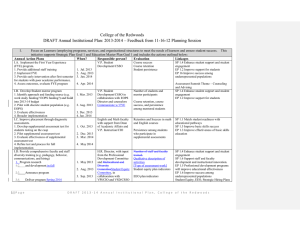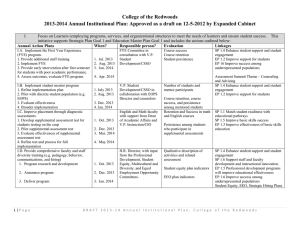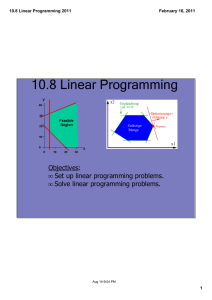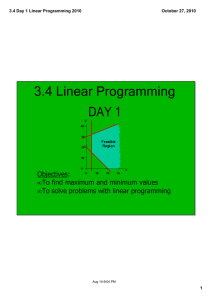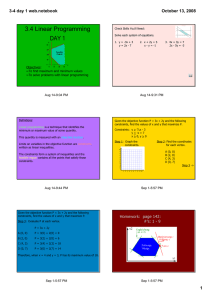Document 12358593
advertisement
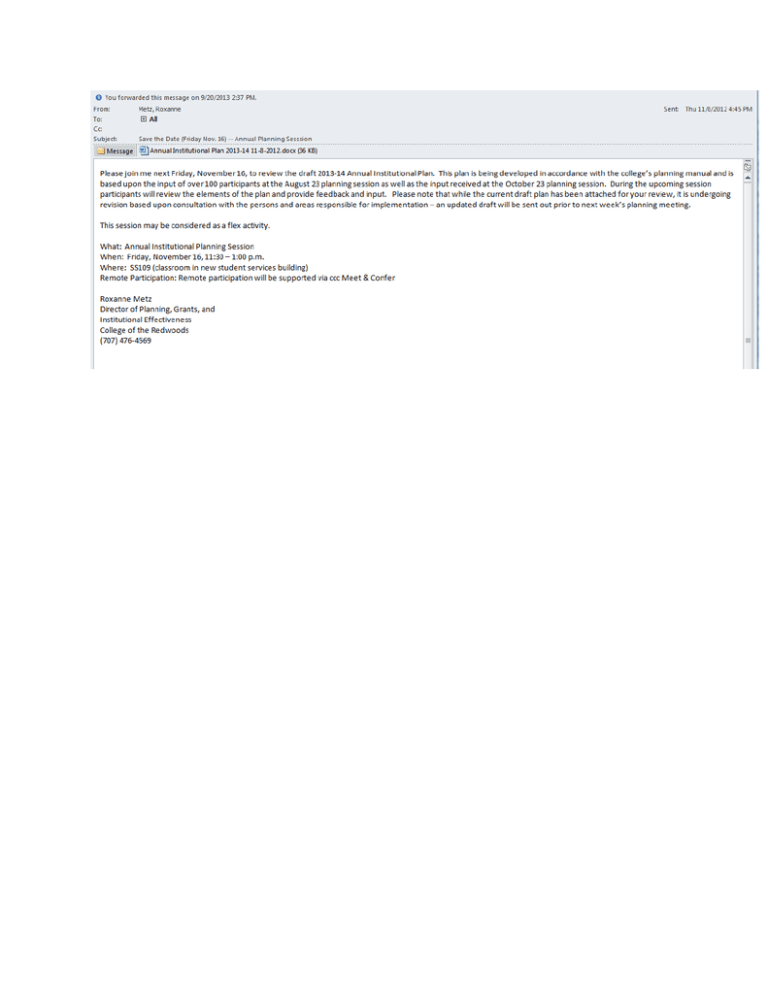
College of the Redwoods DRAFT Annual Institutional Plan: 2013-2014 – as of 11-8-2012 I. Focus on Learners (employing programs, services, and organizational structures to meet the needs of learners and ensure student success. This initiative supports Strategic Plan Goal 1 and Education Master Plan Goal 1 and includes the actions outlined below: Annual Action Plans When? Responsible person? Evaluation Linkages I.A. Implement the First Year Experience (FYE) program. 1. Provide additional staff training 2. Implement FYE 3. Provide early intervention after first semester for students with poor academic performance. 4. Assess outcomes, evaluate FYE program I.B. Develop Student mentor program 1. Identify approach and funding source (e.g. work study funding? EOPS funding?) and build into 2013-14 budget 2. Pilot with discrete student population (e.g. EOPS) 3. Evaluate effectiveness 4. Broader implementation I.C. Improve placement through diagnostic assessments. 1. Develop supplemental assessment test for students testing on the cusp 2. Pilot supplemental assessment test 3. Evaluate effectiveness of supplemental assessment test 4. Refine test and process for full implementation I.D. Provide comprehensive faculty and staff diversity training (e.g. pedagogy, behavior, communications, and hiring) 1. Program research and development V.P. Student Development/CSSO 1. Jul. 2013 2. Aug. 2013 3. Jan. 2014 Course success Course retention Student persistence 4. Apr. 2014 1. Mar. 2013 V.P. Student Development/CSSO in collaboration with EOPS Director and counselors Number of students and mentor participants English and Math faculty with support from Dean of Academic Affairs and V.P. Instruction/CIO Retention and Success in math and English courses H.R. Director, with input from the Professional Development Committee and Multicultural and Diversity Committee, in collaboration with VPI/CIO and VSD/CSSO Number of staff and faculty trained. 2. Aug. 2013 SP 1.4 Enhance student support and student engagement EP 1.2 Improve support for students EP 16 Improve success among underrepresented populations Assessment Summit Theme – Counseling and Advising SP 1.4 Enhance student support and student engagement EP 1.2 Improve support for students Course retention, course success, and persistence among mentored students 3. Dec. 2013 4. Jan. 2014 1. Oct. 2013 2. Dec. 2013 3. Mar. 2014 Persistence among students who participate in supplemental assessments SP 1.1 Match student readiness with educational pathways SP 1.5 Improve basic skills success EP 1.3 Improve effectiveness of basic skills education 4. May 2014 1. May 2013 2. Announce program 2. Aug. 2013 3. Deliver program 3. Sep. 2013 Student equity plan indicators EEO plan indicators SP 1.4 Enhance student support and student engagement SP 1.6 Support staff and faculty development and instructional innovation. EP 1.5 Professional development programs will improve educational effectiveness EP 1.6 Improve success among underrepresented populations Student Equity, EEO, Strategic Hiring Plans II. Develop Programs and Services to Meet Community Needs: This initiative supports Strategic Plan Goals 1 and 2 and Education Master Plan Goal 2 and includes the actions outlined below. Annual Action Plans When? Responsible person? Evaluation Linkages II.A. Collect and analyze labor market data 1. Identify research questions 2. Identify regional partners (e.g. regional EDD Labor Market Info. representative) 3. Collaborate with regional partners and Centers of Excellence to design research methodology 4. Conduct research 5. Analyze data 6. Write report II.B. Implement AP 4021 Program Revitalization or Discontinuation Process 1. Identify programs with trends showing low or declining enrollment, decreasing demand, or obsolescence 2. Form task forces to review data and issue written reports of recommendations 3. Develop action plans for program revitalization or discontinuation II.C. Develop industry-recognized trainings to meet local employment needs. 1. Generate ideas based upon business leaders summit and other outreach 2. Investigate market demand, costs, likely revenues of new programs. 3. Select and implement one or more new training programs. II.D. Support bundled contract training for smaller communities. 1. Identify programs requiring or benefitting from bundled education and training 2. Develop technology specifications 3. Procure and install technology and equipment 4. Complete instructional design 5. Advertise and offer bundled programs 1. May 2013 2. Jun. 2013 CTE Dean in collaboration with IR Director Data can be used by programs to identify industries and occupations of opportunity as well as occupations and industries in decline. EMP 2.4 CTE programs respond to community training needs 3. Jul. 2013 4. Sep. 2013 5. Oct. 2013 6. Nov. 2013 1. Dec. 2012 V.P. Instruction/CIO in collaboration with faculty in accordance with AP 4021 SP 1.2 Continuously assess and evaluate programs to provide effective educational programs and services for all learners. SP 3.5 Practice continuous quality improvement 2. Feb. 2013 3. Mar. 2013 1. May 2013 Community and Economic Development Staff New trainings developed and offered Number of community ed and contract training classes/ participants based upon newly identified opportunities BTC Director in collaboration with Director of Distance Education and with support from Technology Services Classes offered in alternative format (e.g. distance education or hybrid) 2. Sep. 2013 EMP 2.4 CTE programs respond to community training needs SP 2.2 Respond to business and industry short-term training needs. EP 2.1 Enhance community education program. 3. Jan. 2014 1. Jul. 2013 2. 3. 4. 5. Sep. 2013 Oct. 2013 Dec. 2013 Feb. 2014 Students participating in alternative format community education and contract training classes. EMP 2.2 Enhance incumbent worker and contract training III. Improve Fiscal and Operational Sustainability. This initiative supports Strategic Plan Goal 3 and includes the actions outlined below: Annual Action Plans When? Responsible person? Evaluation Linkages III.A. Implement eforms for business and student service processes. 1. Map business and student service 1. processes 2. Develop staged implementation plan 2. 3. Implement at least 3 eforms 3. III.B. Implement an institutional structure to continuously monitor accreditation compliance 1. Design accreditation compliance 1. structure 2. Utilize participatory governance 2. processes for review/approval of structure 3. Implement accreditation compliance 3. structure. May 2013 Aug. 2013 Feb. 2014 Feb. 2013 Technology Services director in collaboration with data owners and managers in key operational areas. Three eforms are developed and in use President/Superintendent and Accreditation Liaison Officer Institutional structure is in place Staff and faculty survey TP 3.2 Support electronic forms and business processes SP 3.2 Improve college operational efficiencies SP 4.4 Improve efficiency through technology SP 3.6 Practice continuous adherence to accreditation standards. Effectiveness will be evaluated through selfevaluation process. Apr. 2013 Aug. 2013 IV. Technological Relevance. This initiative supports Strategic Plan Goal 4 and includes the actions outlined below: Annual Action Plans When? Responsible person? Evaluation Linkages IV.A. Utilize electronic student education plan (SEP) data to analyze course demand. 1. Identify additional programming and training needs 2. Program online SEP process 3. Provide Datatel/Webadvisor training 4. Pilot online SEP development 5. Refine and fully implement online SEP development 1. Feb. 2013 2. 3. 4. 5. Aug. 2013 Sep. 2013 Oct. 2013 Jan. 2014 VP Student Development/ CSSO. Requires resource support from Technology Services Database indicating the frequency of course needed by students is available. SP 4.5 Improve data gathering and utilization to support instructional, student service, and administrative decision making. EP 3.4 Systematically use data to inform decision making.
